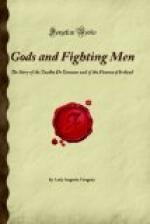That is not the way I used to be, without fighting, without battles, without learning feats, without young girls, without music, without harps, without bruising bones, without great deeds; without increase of learning, without generosity, without drinking at feasts, without courting, without hunting, the two trades I was used to; without going out to battle, Ochone! the want of them is sorrowful to me.
No hunting of deer or stag, it is not like that I would wish to be; no leashes for our hounds, no hounds; it is long the clouds are over me to-night!
Without rising up to do bravery as we were used, without playing as we had a mind; without swimming of our fighting men in the lake; it is long the clouds are over me to-night!
There is no one at all in the world the way I am; it is a pity the way I am; an old man dragging stones; it is long the clouds are over me to-night!
I am the last of the Fianna, great Oisin, son of Finn, listening to the voice of bells; it is long the clouds are over me to-night!
NOTES
I. THE APOLOGY
The Irish text of the greater number of the stories in this book has been published, and from this text I have worked, making my own translation as far as my scholarship goes, and when it fails, taking the meaning given by better scholars. In some cases the Irish text has not been printed, and I have had to work by comparing and piecing together various translations. I have had to put a connecting sentence of my own here and there, and I have fused different versions together, and condensed many passages, and I have left out many, using the choice that is a perpetual refusing, in trying to get some clear outline of the doings of the heroes.
I have found it more natural to tell the stories in the manner of the thatched houses, where I have heard so many legends of Finn and his friends, and Oisin and Patrick, and the Ever-Living Ones, and the Country of the Young, rather than in the manner of the slated houses, where I have not heard them.
Four years ago, Dr Atkinson, a Professor of Trinity College, Dublin, in his evidence before the Commission of Intermediate Education, said of the old literature of Ireland:—“It has scarcely been touched by the movements of the great literatures; it is the untrained popular feeling. Therefore it is almost intolerably low in tone—I do not mean naughty, but low; and every now and then, when the circumstance occasions it, it goes down lower than low ... If I read the books in the Greek, the Latin or the French course, in almost every one of them there is something with an ideal ring about it—something that I can read with positive pleasure—something that has what the child might take with him as a [Greek: ktema eis dei]—a perpetual treasure; but if I read the Irish books, I see nothing ideal in them, and my astonishment is that through the whole range of Irish literature that I have read (and I have read an enormous range of it), the smallness of the element of idealism is most noticeable ... And as there is very little idealism there is very little imagination ... The Irish tales as a rule are devoid of it fundamentally.”




